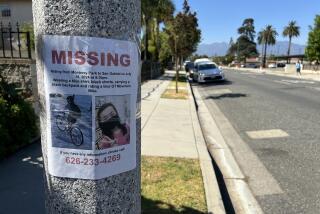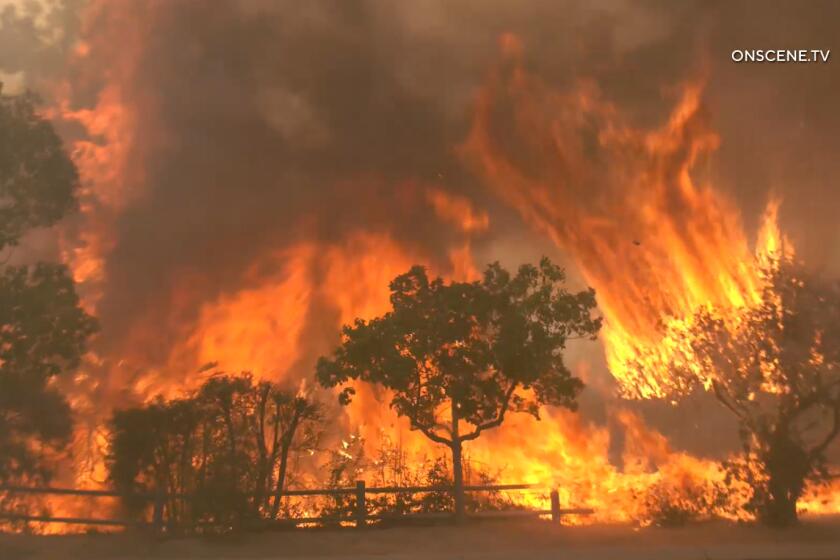Rabin’s Death Like ‘a Loss in the Family’ for Local Jews : Reaction: County’s 80,000-member Jewish community mourns slain Israeli leader and hopes peace process continues. Arab residents also express shock and sadness.
It was a death in the family Saturday.
Within hours the phone lines had established a network of mourning, linking Orange County to Israel, family member to family member, rabbi to rabbi. Israeli Prime Minister Yitzhak Rabin had been killed by a fellow Jew. How could this be?
And what, people asked, their voices heavy with sadness, will happen to the peace accord freshly brokered with the Palestinians?
“What a despicable world that someone had the courage to make peace with Yasser Arafat to be shot by one of his own people,” said Rabbi Bradley Artson of Temple Eilat in Mission Viejo, his voice choking with emotion as he spoke. “It’s a perversion of everything Judaism and Jewish values is all about.”
In much the way the 1963 assassination of President John F. Kennedy became a defining moment for many Americans, the horror of Rabin’s killing--the first of an Israeli prime minister in the country’s 47-year history--froze a certain time and place for the 80,000-member Orange County Jewish community Saturday, from teen-agers to shop owners to rabbis.
Denora Knecht, 16, a student at Buena Park High School, said she felt a sick feeling in the pit of her stomach. “He didn’t do anything wrong,” she said. “He was just trying to make peace for his country; it’s horrible.”
Harvey Liss, 53, president of an Irvine computer company, said he had “a feeling of weakness, like when you have a loss in the family. It’s such a huge loss of time, effort, hope and dreams.”
The news had come like a bombshell over televisions, radios, telephones. Police had arrested a 27-year-old law student said to be active in the Jewish settler movement in the West Bank--for shooting the prime minister.
“It’s kind of like we’re our own worst enemy,” Liss said sadly.
Blossom Siegel of Newport Beach instantly telephoned her cousins who live near Tel Aviv.
They told her they were at the peace rally where Rabin was killed, that they had heard the gunfire with their own ears.
“They said they were absolutely in shock, that most of the state of Israel was in shock,” said Siegel, president of the Jewish Federation of Orange County. “It’s very difficult to go about the things you planned to do. . . . Things have kind of come to a standstill.”
Within hours, a memorial service was planned for 6 p.m. Monday in Chisick Auditorium at the Jewish Federation campus on Baker Street in Costa Mesa. A long-planned community fair next weekend was quickly recast as a program in support of Israel.
*
Once the initial personal horror subsided, mourners wondered if the hard-fought peace process would come unglued.
“The monument to Rabin has to be to make sure the peace works,” Artson said.
Artson and others predicted that the assassination would only strengthen the resolve of most Jews to support it.
“This rises above politics,” he said. “It also will show moderate Israelis that strident rhetoric and calls for acts of violence are inducements to violence.”
The shock and sadness also struck the Arab community, where many expressed almost identical worries about the fragile peace.
Don Bustany, the former president of the American-Arab Anti-Discrimination Committee’s Los Angeles chapter, said he was certain that the “offense of putting a bullet in a man because of a political disagreement” would rally Israelis.
“My first reaction was ‘Oh, my God. I hope it’s not an Arab,’ ” said Bustany, who was among several hundred people attending the committee’s West Coast Conference in Anaheim on Saturday. Rabin’s assassin will become the “Israeli John Wilkes Booth,” whose deed would galvanize support for a slain leader’s cause, Bustany said.
Waleed Ali, an organizer of the group, said the tragedy may be the price that must be paid for peace. “The possibility of an execution has always loomed strongly. But I think there was an unwritten pledge between the leaders that the process would go on,” he said.
Dana Point restaurant owner Samir Ibreighith, a Palestinian native whose father is the mayor of a town in the West Bank, called the killing a “big setback. . . . We lost somebody who was very good for world peace.”
Some Jewish leaders said Rabin’s death will be a wake-up call to moderate Jews, many of whom had dismissed the escalating protests of the right-wing opponents of the peace process.
“The great tragedy is that I think none of us, Israeli or American Jews, took seriously the rhetoric of the extremists,” said Rabbi Arnold Rachlis of University Synagogue in Irvine. “We Jews couldn’t believe that we could have people like this among our people because we don’t want to see ourselves this way.”
*
Orthodox Rabbi David Eliezrie, who has been sharply critical of Rabin’s peace policies, said the crime is indicative of the prime minister’s lack of support among Israelis and should cause the government to re-examine its direction.
“What I was fearful of has tragically happened,” Eliezrie said. “Rabin has been pushing the people to the political limits, and a Jew has taken the life of another Jew. I condemn in every possible way this act of violence against him, but I believe that it is time to pause a bit and examine carefully these policies.”
One thing was clear: Rabin’s policies had incurred a boiling hatred among some in the Jewish community that was not lessened by his death. “There are certain Israeli citizens that are willing to give up their lives” to prevent “the so-called peace surrender accords,” said Howard Garber, president of the Orange County chapter of Americans for a Safe Israel.
Garber said because Rabin’s efforts worked against a Jewish-only democracy, he was an enemy of Israel and “must be regarded as the enemy.”
For many, the sentiments of Garber and others like him will gain new attention in coming weeks. The bold assassination, just after Rabin led a song of peace, brought into sharp focus the pressure-cooker Israel has become.
Irv Golper, president of the Jewish Community Center of Orange County, said the killing was “another expression of what violence can do to a person, what violence can do to a country, no matter where it is. . . . When you get this overheated rhetoric, these types of things happen--when you get unbalanced people who do terribly unbalanced things.”
Rabbi Stephen Einstein of Congregation B’nai Tzedek in Fountain Valley said only time will tell whether the tragedy will translate into a united Israeli effort to achieve peace.
“The politically correct thing for the opposition is to shut up awhile, but it doesn’t mean they’re going to change their political thinking,” he said.
But for many Jews, Rabin’s assassination wrenched their attention from questions of politics and focused it on painful, spiritual questions about bonds the Jewish community had held inviolate.
“ ‘Why does one Jew kill another?’ is the question I’m asking myself,” said Rabbi Lawrence Goldmark of Temple Beth Or in La Mirada. It also is the question congregation members called to ask him Saturday, and the question he will answer when he talks to children about the assassination, he said.
“I’ll tell them that people can be driven to this extreme when they feel that other person is so wrong,” Goldmark said. “Even Jewish people can be driven to that--we’re no different.”
*
Rabin’s death is a call for all Jews who agreed with his vision to take on the task of bringing about peace, he said.
“We’ve got to finish the job now,” Goldmark said. “There’s a statement in the Talmud that says it is not up to you to complete the task, but neither are you free to desist from it.”
Goldmark said Jews can take comfort that Rabin did not give his life for “something senseless or trivial. Rabin was a martyr who died trying to achieve peace, and of all the reasons a person can give their life to, that one is sublime.”
This article was reported by Times staff writers Tracy Weber, Deborah Schoch, David Haldane, Lisa Richardson and Karen D’Souza. It was written by Weber.
More to Read
Sign up for Essential California
The most important California stories and recommendations in your inbox every morning.
You may occasionally receive promotional content from the Los Angeles Times.






